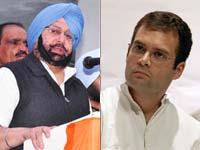India’s Congress party faces key electoral tests

Located in a government school in Badal village of Lambi assembly seat in Punjab, polling booth No.106 may be a nondescript place but it turned out to be the battleground for the politically feuding first family of Punjab politics -- the Badals.
As day broke over this village Monday morning, the polling booth became the most important address of Punjab politics as the state's 117 assembly seats went up for grabs.
Listed among the names of voters in this polling station was Punjab Chief Minister Parkash Singh Badal, his son and Akali Dal president Sukhbir Singh Badal who is also the deputy chief minister, Bathinda MP and Sukhbir's wife Harsimrat Badal, chief minister's nephew and People's Party of Punjab (PPP) president Manpreet Singh Badal, chief minister's younger brother and PPP candidate Gurdas Badal and their cousin and Congress candidate Maheshinder Singh Badal.
Incumbent Parkash Singh Badal, 84, is facing his toughest political test as he is locked in a bitter triangular contest with his younger brother Gurdas Badal, 81, of the PPP and cousin Maheshinder Singh Badal, 50, of the Congress from the Lambi seat.
The Badals, who were once a united family, have now been politically divided among the Akali Dal, Congress and the PPP. The political feud within the family has left the simple villagers of Badal village confused.
"It is very difficult for voters of Badal to decide which one to vote for. Whatever the outcome of the poll here, a Badal will win and a Badal will lose," Manga Singh, a villager, said outside the polling station.
As many as 1.8 million Punjabis voted for 1,078 candidates, including two chief ministerial aspirants - Parkash Singh Badal of the ruling SAD-BJP alliance and Capt Amarinder Singh of the Congress.
Results will be known on March 6.
Besides the over 75,000 security personnel, the Election Commission will keep an eye on polling stations with the help of 2,627 video and 554 digital cameras in 2,718 polling stations that have been identified as hyper-sensitive. As many as 203 polling stations would witness webcasting for the first time, the Tribune reported.
The ruling SAD-BJP combine, the Indian National Congress and BSP are contesting all 117 seats, PPP is contesting 92, SAD (Amritsar) is pitted on 57 seats. Out of 1,078 candidates in fray, including 417 Independents, 93 are women. During the last elections, 1,055 candidates were in the fray.
In addition to Punjab, state elections were also held in Uttarakhand and Manipur. Uttar Pradesh and Goa will also vote in the next few weeks,
"The people of Punjab want to oust the (incumbent) Akalis. There has been no development," Congress's chief ministerial candidate for Punjab Amarinder Singh said.
In mountainous Uttarakhand, the Hindu nationalist Bharatiya Janata Party (BJP) is fighting to gain a second term in power in face of opposition from Congress. The state has 70 assembly seats, said the BBC Indian service.
Chief Minister BC Khanduri replaced Ramesh Pokhriyal Nishank last year following corruption allegations.
Correspondents say the polls are critical for the ruling Congress party, which is trying to combat high inflation and bolster an economy that is slowing down.
Prime Minister Manmohan Singh and his government have also been on the defensive in recent months on the issue of corruption, struggling to get a bill on a new ombudsman through parliament.
The state polls are a key litmus test ahead of national elections, which are due in 2014.
They could also throw light on the future of Rahul Gandhi, the latest leading light in the powerful political dynasty who has campaigned actively in the elections and is considered a possible future prime minister.
Leave a comment









